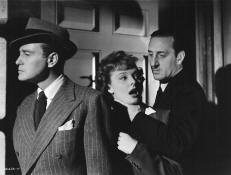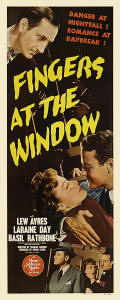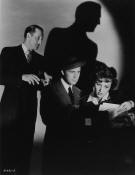Fingers
at the Window
|
|
This video clip (from Turner Classic Movies) shows how Rathbone's character persuades a lunatic to commit murder:
|
Oliver Duffy continues his investigation. He learns that all of the killers were at one time patients at an insane asylum, and he figures out that only a psychiatrist would have access to the patient records. Even though Edwina says she doesn't know any psychiatrists, Oliver is sure that there is a connection. He takes Edwina to a local conference at which nearly all of Chicago's psychiatrists have gathered. She looks over the faces in the crowd, but doesn't recognize any of them. Next, they go to the home of Dr. Santelle (Basil Rathbone), a prominent psychiatrist who was absent from the conference, although his paper was presented. When his housekeeper tells him who is at the door, Santelle keeps them waiting. He knows that if Edwina sees him, she will recognize him. To avoid that happening, he gets his manservant to pretend to be Dr. Santelle. Oliver and Edwina are completely fooled, so they leave, wondering where to go next.
Even though Oliver feels as much in the dark as ever, Santelle feels that Oliver is getting to close to the truth. He must be stopped! Two attempts are made to kill Duffy, and the second one (an overdose of insulin) very nearly succeeded. Through a series of misunderstandings, the police come to believe that Oliver Duffy is the murderous criminal, and Dr. Santelle's life is in danger.
Meanwhile, Edwina has followed Dr. Santelle to his home. She caught a glimpse of him at the hospital and recognized him. It turns out that Edwina knew Santelle when she lived in Paris, but he went by a different name then, Cesar Ferrari. She confronts him at his home and he explains that the real Dr. Santelle died in Paris. Cesar stole Santelle's identity in order to claim a huge sum of money that Santelle inherited. No one in Chicago knew what the real Dr. Santelle looked like. The only people who could expose Cesar as a fraud were the handful of people who knew him in Paris. And so he arranged to have them murdered by ax-wielding lunatics. Of course. It all makes sense now.
In a panic, Edwina tries to leave, and Cesar knocks her out cold. Before he has a chance to kill her, the police knock at the door. He quickly stuffs Edwina into a closet and answers the door. The police are there to warn him that a lunatic named Oliver Duffy is after him. Santelle thought he had killed Oliver, so he blurts out, "That's impossible!" but quickly covers his faux pas. Sure enough, Duffy shows up at Santelle's house and the police grab him. As they are about to leave with Duffy in custody, one of them notices something that indicates Edwina Brown has been in Santelle's house. Realizing that the jig is up, Santelle pulls a gun out and shoots at the police. At this point the police realize they were wrong about Santelle. They return fire and kill him. When Edwina is rescued from the closet, she insists that she must marry Duffy right away. But why? he asks. She is so shaken by her ordeal that she doesn't want to spend a single night alone ever again!
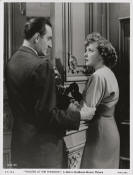 Santelle has Edwina trapped in his home. |
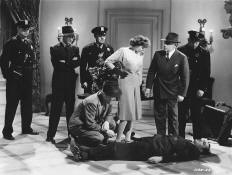 The murders end with Santelle's death. |
The film is certainly enjoyable to watch, combining light suspense with light comedy. The biggest complaint I have about this movie is that we don't see much of Basil. But what we do see of him is wonderful. He is sinister and scary. Variety reported, "Rathbone makes an elegant menace, cold, bitter, determined to kill all who might cause him to lose his stolen riches."1
Reviews for the film were mixed. The New York Times called it "soft and lukewarm," saying the story was implausible.2 Film Daily reported that it was well-made, well-acted, and exciting.3 Motion Picture Daily reported, "Here is a thriller which should keep the youngsters on the edge of their seats most of the way along, and at the same time should be found entertaining by those of the patrons who like their films with action of the murder variety, plenty of suspense, and a dash of romance."4 Showmen's Trade Review, however, described the film as "average mystery fare."5
Charles Lederer was a noted screenwriter in the 1930s. Fingers at the Window was his first attempt at directing a film. His directing was adequate, but nothing special.
This was the last film that Lew Ayres made before being drafted for the Army. After Pearl Harbor was attacked, the majority of Americans recognized the threat and were united in their support of the war. Anyone who wasn't willing to fight was viewed as unpatriotic or cowardly. Shortly before the release of Fingers at the Window, Lew Ayres announced that he was a conscientious objector. Public opinion turned against him and some of the movie theaters cancelled their bookings of all films in which Lew Ayres starred. According to Motion Picture Daily, "All films starring Lew Ayres, including the 'Kildare' series, were banned yesterday in all Balaban & Katz theatres in Chicago and vicinity and the Great States downstate circuit, totaling 100 houses."6 Other theaters realized that canceling Lew Ayres' films wasn't fair to the rest of the cast. During the war Ayres served in the Medical Corps as a noncombatant.
| Watch the trailer for Fingers at the Window:
|
See more photos on page 2 and page 3.
Cast |
Credits |
|||
| Basil Rathbone ................. | Dr. H. Santelle | Production Co. ................ | MGM | |
| Lew Ayres ........................ | Oliver Duffy | Producer .......................... | Irving Starr | |
| Laraine Day ...................... | Edwina Brown | Director ............................ | Charles Lederer | |
| Walter Kingsford ............. | Dr. Cromwell | Asst. Director ................. | Bert Spurlin | |
| Miles Mander ................... | Dr. Kurt Immelman |
Screenplay ...................... |
Lawrence P. Bachmann | |
| Charles D. Brown ............ | Insp. Gallagher | and Rose Caylor | ||
| Cliff Clark .......................... | Lt. Allison | Cinematographers ............ | Charles Lawton and | |
| James Flavin .................... | Lt. Schaeffer | Harry Stradling | ||
| Russell Gleason ............... | Ogilvie |
Editor ................................ |
George Boemler | |
| William Tannen ............... | Devlan |
Orchestrator .................... |
Leonid Raab |
|
| Mark Daniels .................... | Hagney |
Music Composer ............. |
Bronislau Kaper |
|
| Bert Roach ........................ | Krum | Art Director ...................... | Cedric Gibbons | |
| Russell Hicks ................... | Dr. Chandley | Assoc. Art Director ........ | William Ferrari | |
| Charles Wagenheim ........ | Fred Bixley | Set Decorator .................. | Edwin B. Willis | |
| Robert E. Homans ............ | Officer O'Garrity | Recording Director ......... | Douglas Shearer | |
| Uncredited Cast: | Costume Design ............. | Howard Shoup | ||
| Iris Adrian ....................... | Babe Stanton | Technical Advisor ......... | Charles Mandell | |
| Ruth Alder ...................... | minor role | |||
| Ernie Alexander ............. | reporter | |||
| Sam Ash ......................... | theater stage-manager | |||
| Hooper Atchley ............. | ambulance doctor | |||
| King Baggot ................... | psyhiatrist at lecture | |||
| William Bailey ................ | policeman at hotel | |||
| Arthur Belasco .............. | fat man | |||
| Brooks Benedict ........... | psyhiatrist at lecture | |||
| Margaret Bert ................ | Mrs. Geversar (Dr. Santelle's maid) | |||
| Robert Bradford ............. | whistles "Over the Rainbow" | |||
| Ralph Brooks ................. | Dr. Shepherd | |||
| Rand Brooks .................. | young reporter | |||
| Eddie Buzard .................. | tall newsboy | |||
| Bobby Callahan ............. | small newsboy | |||
| George M. Carleton ....... | meeting chairman | |||
| Wally Cassell ................. | photographer | |||
| Eddy Chandler ............... | mounted policeman | |||
| Jules Cowles ................... | crazy man at clinic | |||
| Mary Currier ................... | Miss Hewitt (hospital nurse) | |||
| Cliff Danielson ............... | hotel clerk | |||
| Leslie Denison ............... | Paul (works for Santelle) | |||
| Lester Dorr ..................... | photographer | |||
| Ralph Dunn ................... | policeman outside clinic | |||
| Byron Foulger ............... | bird man | |||
| Jack Gardner .................. | reporter | |||
| Rudy Germaine .............. | minor role | |||
| Edward Hearn ................ | citizen | |||
| Edna Holland ................. | clinic nurse | |||
| John Ince ....................... | minor role | |||
| William Lally ................. | police sergeant | |||
| George Magrill .............. | policeman | |||
| Jerry Maren ................... | small boy | |||
| Frank Marlowe .............. | cabbie with cat | |||
| Frank McClure ............... | psychiatrist at lecture | |||
| Dick Midgley ................. | police driver | |||
| Harold Miller .................. | psychiatrist at lecture | |||
| James Millican ............... | reporter | |||
| Roger Moore .................. | Jim (actor) | |||
| Arthur O'Connell ............ | photographer | |||
| George Ovey ................... | old man with telegram | |||
| Eddie Parker .................... | ambulance driver | |||
| Milton Parsons ............... | Jarvis J. Banhoff (first axe murderer) | |||
| Lee Phelps ....................... | police telephone operator | |||
| "Snub" Pollard ............... | minor role | |||
| Frances Rafferty ............ | clinic switchboard operator | |||
| Cyril Ring ....................... | psychiatrist at lecture | |||
| Edwin Stanley ................ | hospital doctor | |||
| Ray Teal .......................... | police car #12 driver | |||
| David Tihmar .................. | dance teacher | |||
| Emmett Vogan ................ | hotel manager | |||
| Frank Whitbeck .............. | trailer announcer | |||
| Joe Yule ........................... | citizen | |||
Photos are from the film Fingers at the Window, copyright Metro Goldwyn Mayer.
Notes
- Variety, March 16, 1942
- Bosley Crowther, New York Times review of Fingers at the Window, April 23, 1942
- Film Daily, March 18, 1942
- Motion Picture Daily, March 16, 1942, p. 6
- Showmen's Trade Review, March 14, 1942
- Motion Picture Daily, April 3, 1942, p. 5







